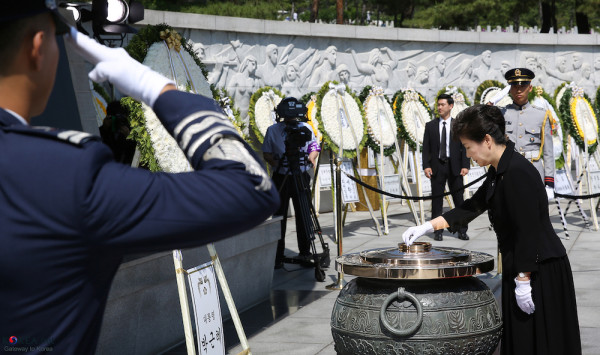

In 1868, the Grand Army of the Republic created Decoration Day to honor the soldiers who died in the U.S. Civil War. Since then, the day has evolved into Memorial Day, a national holiday celebrated on the last Monday of May each year.
But we aren’t the only ones with special days to honor the fallen soldier. Countries across the world have their own holidays that commemorate those troops who made the ultimate sacrifice. Here are the ways that nine different countries observe and remember those who never returned home from the battlefield.
France
Armistice Day in France is observed with moment of silence at 11 a.m. on the 11th day of the 11th month — Nov. 11, which is Veterans Day in the United States. In France, the day is full of ceremonies, special church services, and everything is adorned with poppy flowers. The holiday originally commemorated the 1.4 million people killed during World War I, but has come to include all French citizens lost to armed conflict.
England

Remembrance Day, often called Poppy Day, is observed on Nov. 11. Since 1919, England has commemorated those lost during the First World War, though the day was originally known as Armistice Day. In 1921, the poppy flower became an emblem of remembrance as they bloomed across battlefields. Their bright red color came to symbolize the blood spilled during the war. And the poem, “In Flanders Fields,” by Canadian physician Lt.-Col. John McCrae, has become synonymous with the poppy and England’s memorial ceremonies.
New Zealand and Australia
The two nations celebrate Anzac Day on April 25 to commemorate when Australian and New Zealand forces entered World War I during the Gallipoli Campaign in 1915. One of the traditions of Anzac Day is the “gunfire breakfast,” which is essentially coffee with rum added. It mimics the breakfast drink consumed by many soldiers before heading into battle.
Related: Create A Video On What Memorial Day Really Means »
Canada
On April 9, Canadians honor those who victoriously fought in the battle of Vimy Ridge in northern France during the World War I. The day is also known as the National Day of Remembrance of the Battle of Vimy Ridge. The country also has a Remembrance Day on Nov. 11, which commemorates Canada’s servicemen and women, and at 11 a.m., the country holds a two-minute silence in memory of those who perished.
Germany

Two Sundays before the first day of Advent, Germans celebrate Volkstrauertag to commemorates all those who died in armed conflicts or as the victims of violent oppression. It was first observed in 1952, and each year the president of Germany gives a speech followed by the national anthem and the song “Ich hatt’ einen Kameraden” or “I Had a Comrade.”
South Korea
On June 6, South Korea celebrates its own Memorial Day. The month was chosen to commemorate when the Korean War began. Since 1956, the country has held a ceremony in the National Cemetery in Seoul. At 10:00 a.m., a siren rings all over the country, and people honor the dead with silent prayers for one minute.
The Netherlands
Each year after World War II, on May 4, the Dutch observe Dodenherdenking, which translates to “remembrance of the dead.” Until 1961, the commemoration only related to the Dutch victims of World War II, but after it was changed to include all those lost in armed conflict. At 8 p.m., two minutes of silence are observed throughout the Netherlands. Public transport is stopped, as is television, and radio.
Italy

Italians celebrate National Unity and Armed Forces Day on Nov. 4. It commemorates the Allied victory of Italy over Austria-Hungary in 1918 during World War I. Though it is no longer a public holiday, a solemn wreath-laying ceremony is usually held at the Altare della Patria — Rome’s Tomb of the Unknown Soldier.
Nigeria
The country once celebrated Armed Forces Remembrance Day on Nov. 11. However, in 1970, the government moved it to Jan. 15 to commemorate the end of Nigeria’s civil war. Since the rise of Boko Haram, President Goodluck Jonathan has encouraged Nigerians to ramp up the commemorations. In 2015, he led government officials to lay wreaths at the tomb of soldiers.